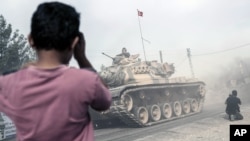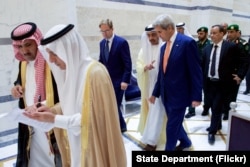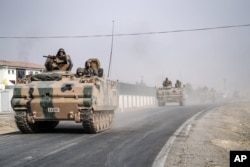ລັດຖະມົນຕີຕ່າງປະເທດສະຫະລັດ ທ່ານ John Kerry ແລະລັດຖະມົນຕີຕ່າງປະເທດ ຣັດເຊຍ ທ່ານ Sergei Lavrov ໄດ້ເລີ້ມການໂອ້ລົມກັນ ທີ່ນະຄອນ Geneva ໃນວັນສຸກມື້ນີ້ ໃນຄວາມພະຍາຍາມເພື່ອຢາກໃຫ້ມີການເຈລະຈາ ຫາທາງຍຸຕິການສູ້ລົບໃນຊີເຣຍ ດ້ວຍສັນຕິວິທີ.
ທ່ານ Kerry ໄດ້ເດີນທາງໄປປະເທດຊາອຸດີ ອາຣາເບຍ ໃນວັນພະຫັດວານນີ້ເພື່ອສົນ ທະນາກ່ຽວກັບ ການປະຕິບັດງານທະຫານຂອງສະຫະລັດ ຢູ່ໃນຊີເຣຍ ກັບເຈົ້າຊາຍ Mohammed bin Salman ຂອງຊາອຸດີ ພ້ອມດ້ວຍບັນດານັກການທູດຈາກ ບາຫ໌ເຣນ ແລະສະພາການຮ່ວມມືໃນເຂດອ່າວເປີເຊຍ ເພຶ່ອໃຫ້ ການສະໜັບສະໜູນເພີ້ມຂຶ້ນຕໍ່ ແຜນຊີເຣຍ ກ່ອນໜ້າການພົບປະກັບທ່ານ Lavrov ໃນວັນສຸກມື້ນີ້.
ໃນການເຈລະຈາລະຮອບກ່ອນ ຫວ່າງນັກການທູດສູງສຸດ ຂອງວໍຊິງຕັນ ແລະມົສກູ ໄດ້ ປະສົບກັບຄວາມລົ້ມແຫລວ ໂດຍບໍ່ສາມາດຍຸຕິບັນຫາຂັດແຍ້ງໃນຊີເຣຍ ທີ່ສັບສົນຍ້ອນສະຫະລັດ ແລະຣັດເຊຍ ຕ່າງກໍໃຫ້ການສະໜັບສະໜູນຕໍ່ຝ່າຍກົງກັນຂ້າມ.
ໃນລະຫວ່າງການພົບປະກັບທ່ານ Lavrov ນັ້ນ ທັງສອງຝ່າຍຈະພະຍາມຫາ ທາງຕົກລົງກັນ ກ່ຽວກັບການປະຕິບັດງານທາງທະຫານ ແລະການແບ່ງປັນຂໍ້ມູນ ເພື່ອເອົາຊະນະພວກຫົວຮຸນແຮງລັດອິສລາມໃນຊີເຣຍ ທີ່ທັງສອງຝ່າຍຕ່າງກໍຕ້ອງການນັ້ນ.
ແຜນການຕົ້ນຕໍຂອງທ່ານ Kerry ທີ່ໄດ້ເປີດເຜີຍລະຫວ່າງການສົນທະນາໃນເດືອນກໍລະກົດທີ່ນະຄອນມົສກູນັ້ນ ແມ່ນຈະໃຫ້ວໍຊິງຕັນ ແລະມົສກູປະສານ ງານກັນ ໃນການໂຈມຕີທາງອາກາດຕໍ່ພວກນັກລົບລັດອິສລາມ ແລະໃຫ້ກຳລັງທາງອາກາດຂອງຊີເຣຍ ຢຸດເຊົາການໂຈມຕີເພີ້ມຕື່ມ.
ການພົບປະຄັ້ງຫລ້າສຸດນີ້ ມີຂຶ້ນທ່າມກາງຄວາມເຄັ່ງຕືງໃນຊີເຣຍ ຫລັງຈາກ ເທີກີໄດ້ຕັດສິນໃຈໃນຕົ້ນອາທິດນີ້ ສົ່ງລົດຖັງຂ້າມຊາຍແດນເຂົ້າໄປໃນຊີເຣຍ ເພື່ອກວດລ້າງດິນແດນບ່ອນທີ່ຍັງຄວບຄຸມໂດຍກຸ່ມລັດອິສລາມ.
ພວກນັກລົບຊາວເຄີດໃນຊີເຣຍທີ່ສະຫະລັດໜູູນຫລັງ ກ່າວວ່າ ເຂົາເຈົ້າກຳລັງຖອນອອກໄປ ຈາກຄ້າຍຕ່າງໆຂອງເຂົາເຈົ້າ ຢູ່ທາງພາກຕາເວັນອອກຂອງແມ່ນໍ້າ Euraphrates ຫລັງຈາກທະຫານເທີກີ ແລະພວກນັກລົບທີ່ເປັນພັນທະມິດຂອງພວກເຂົາ ໄດ້ເລີ້ມການໂຈມຕີຂ້າມຊາຍແດນ.
U.S. Secretary of State John Kerry and Russian Foreign Minister Sergei Lavrov began talks in Geneva Friday in an effort to negotiate a peaceful end to the fighting in Syria.
Kerry was in Saudi Arabia Thursday to discuss U.S. military operations in Syria with Saudi Prince Mohammed bin Salman, along with diplomats from Bahrain and the Gulf Cooperation Council in order to shore up support for the Syria plan ahead of the Friday meetings with Lavrov.
Previous rounds of negotiations between the top diplomats from Washington and Moscow have failed to produce an end to the conflict in Syria, which is complicated by U.S. and Russian support for opposite sides.
During the meeting with Lavrov, the two sides will try to come to an agreement over military cooperation and information sharing in a bid to defeat Islamic State militants in Syria - something both sides want.
Kerry's initial plan, unveiled during July talks in Moscow, would have Washington and Moscow coordinate airstrikes against Islamic State fighters and stop the Syrian air force from launching any further air attacks.
The latest meeting comes amid heightened tensions in Syria after Turkey decided earlier this week to send tanks across the border into Syria to clear out a pocket of land controlled by the Islamic State group.
U.S.-backed Syrian Kurdish fighters say they are withdrawing to their bases east of the Euphrates River after Turkey's military and allied fighters launched a cross-border offensive. The Kurdish rebels have been a source of tension between the U.S., which views them as a key ally in the war in Syria, and Turkey, which sees them as terrorists allied with separatist Turkish Kurd factions.
A U.S.-led coalition spokesman said the Kurds moved east "to prepare for the eventual liberation of Raqqa." It is unclear, however, if all the Kurdish forces have withdrawn as Turkey had demanded ahead of its offensive. The head of the Britain-based Syrian Observatory for Human Rights, Rami Abdel Rahman, told Arab media that Kurdish militia fighters are still fighting on the western side of the Euphrates River and had even captured some ground.
Turkey's foreign minister said Kerry had spoken with him in a phone call early Thursday and said the Syrian Kurdish forces would withdraw. Vice President Joe Biden this week told Turkey's leaders the Kurds would lose U.S.-support if they did not move back across the Euphrates.
Russia's Foreign Ministry expressed deep concern about the Turkish border operation, especially Turkey's targeting of Kurdish militia fighters. It said that Turkey, by targeting both Islamic State militants and Syrian Kurds, could further inflame the Syrian civil war, leading to "flare-ups of inter-ethnic tensions between Kurds and Arabs."
Middle East analyst Theodore Karasik told VOA Turkey's military offensive on Syrian territory risks further complicating the war, influencing the shifting alliances among various militia factions that have made it difficult for any one side to dominate the conflict. He says Turkey risks escalating the conflict.








